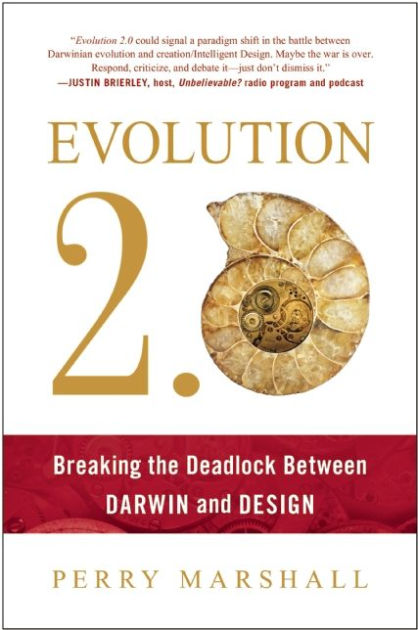|
home | what's new | other sites | contact | about |
||||||
|
Word Gems exploring self-realization, sacred personhood, and full humanity
Perry Marshall's an electrical engineer / computer programmer
return to "Evolution" main-page
Editor's note: The following is from Perry Marshall's book, Evolution 2.0: Breaking the Deadlock between Darwin and Design
“Half the thesis of this book is that randomness does not create codes; and that once they exist, randomness can only destroy them… “RANDOM MUTATION + NATURAL SELECTION + TIME = EXTINCTION not EVOLUTION “There is no such thing [that at times] a corrupted signal is ‘better.’ It’s always worse… This means that DNA copying errors trigger a species’ decline and natural selection finishes it off… “The other half of the thesis [of this book] is that the origin of life required the creation of codes, and that nonrandom, linguistic adaptations of DNA continue to create codes and thus drive biological evolution. Marshall asserts that “the claim that any mutation is random is not provable. This is because, in mathematics, there is no method for proving any sequence of numbers is random. In fact, to prove that anything is random has been proven impossible… “You can’t prove the letters in any word are random [or] the words in any sentence [or] the sentences in any paragraph are random.” Because randomness is not mathematically/scientifically testable, Darwinism is not a scientific theory. The lack of scientific basis for Darwinism, of and by itself, however, does not prove that Darwinism is errant, just as the lack of scientific basis for the existence of God doesn’t mean that God doesn’t exist. Marshall: “Therefore, ‘what is scientifically testable and what is not’ by definition can never be an ultimate measure of truth. As Kurt Godel proved in 1931, no system of logic can prove its own assumptions.” The concept of randomness, to have relevance, must be “defined within a specific frame of reference.” In other words, randomness “is always with respect to something.” Marshall offers the example of a roll of dice. We commonly call this an example of randomness. However, with respect to the laws of physics, the outcome is not random at all. The outcome is random in terms of the lack of precision of the human hands that throw the dice; that is, each time they’re thrown, they tumble in different ways, producing or being subjected to different levels of stress and force. And yet, even with this imprecision of the human hand, if we throw enough dice around, we will achieve a very predictable average outcome. All of this is very interesting: in order to prove that any event is truly random, (1) one would need to prove the absence of any overarching design or purpose involved. In other words, how could we prove that a certain outcome did not unfold in a certain way just as planned? Further, (2) as with the predictable averages of dice-throwing, if large numbers are involved, randomness disappears when a grander perspective is entertained. I think of it like this: Imagine that you’re in southern Florida during a hurricane. In the midst of the gale-force winds, all seems chaotic and random. However, if a higher perspective could be gained, if one could witness the same hurricane a few hundred miles above the Earth, the chaos and randomness suddenly becomes a breathtaking orchestration of symphonic harmony.
There may be mathematical proofs indicating that randomness cannot be proven, but one understandable lesson here is that apparent randomness melts away when we become observers at a higher level. This would be true on any rung of the ladder of material complexity, from sub-atomic particles, all the way up to galaxies and clusters of galaxies. Dr. Sheldrake called this "nested hierarchies," "parts within wholes, wholes within parts." As an aside, in this principle of viewing things from a higher mountain, we will also find the answer to the purpose of suffering in this life and in this world.
|
||||||
|
|


